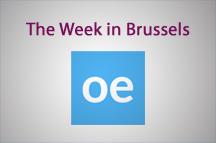 This week, ahead of the annual Summer slowdown, the debate in Brussels was dominated by two things: Brexit and Poland.
This week, ahead of the annual Summer slowdown, the debate in Brussels was dominated by two things: Brexit and Poland.
On Monday, British Brexit Secretary David Davis came to Brussels to give a press conference with EU Brexit negotiator Michel Barnier. There was quite a bit of uproar that he left less than an hour later. Davis responded that “as with any other international negotiation, those talks have now moved to technical working level discussions where over 90 UK officials will meet with their counterparts in the commission, enabling multiple conversations to take place at once.”
A picture showing Team Barnier with papers piled in front of them as Davis and the other British were without documents provoked some social media mockery at the UK’s supposed lack of preparedness, although another secretive document being filmed would of course have led to criticism of Davis as well.
 In terms of content, this week a bit more clarity emerged on the so-called “financial settlement” which needs to be agreed. The UK would reportedly be planning to wait until the 'eleventh hour' before agreeing any such Brexit bill, while the EU would agree to start trade talks from November on also if there wasn’t already a deal on the precise figure of what the UK would need to pay. Still, Barnier stressed that the EU really wants the UK to clarify what it thinks its financial obligations are.
In terms of content, this week a bit more clarity emerged on the so-called “financial settlement” which needs to be agreed. The UK would reportedly be planning to wait until the 'eleventh hour' before agreeing any such Brexit bill, while the EU would agree to start trade talks from November on also if there wasn’t already a deal on the precise figure of what the UK would need to pay. Still, Barnier stressed that the EU really wants the UK to clarify what it thinks its financial obligations are.
Meanwhile, the EU Commission is threatening to propose to strip Poland of its EU voting rights in response to Polish measures to reform the judiciary, which the Commission thinks may be a breach of fundamental rights. The first step in the EU triggering the article 72 procedure would be to decide whether indeed such a breach has happened. Then a qualified majority of member states and two thirds of Member of European Parliament need to agree. EU leaders may be very reluctant to take it that far.
Last but not least, there was also the fall-out from Italy’s supposed “threat” to issue travel visas to migrants, which could be blocked by other EU member states anyway. An Italian official has clarified that the government had never "formally issued" such a proposal, claiming that this was only an idea coming from the Italian parliament. Meanwhile, Austria is fully gearing into election mode, where politicians are making bold pledges to close the border with Italy if necessary. If that were to happen, it may be a game changer in the refugee crisis, forcing Italy to copy what Greece and Australia have basically done: telling asylum seekers to await their request, instead of allowing them to travel on after they have arrived illegally. This isn’t always happening in good circumstances, but it did decrease the number of drownings-at-sea considerably.













